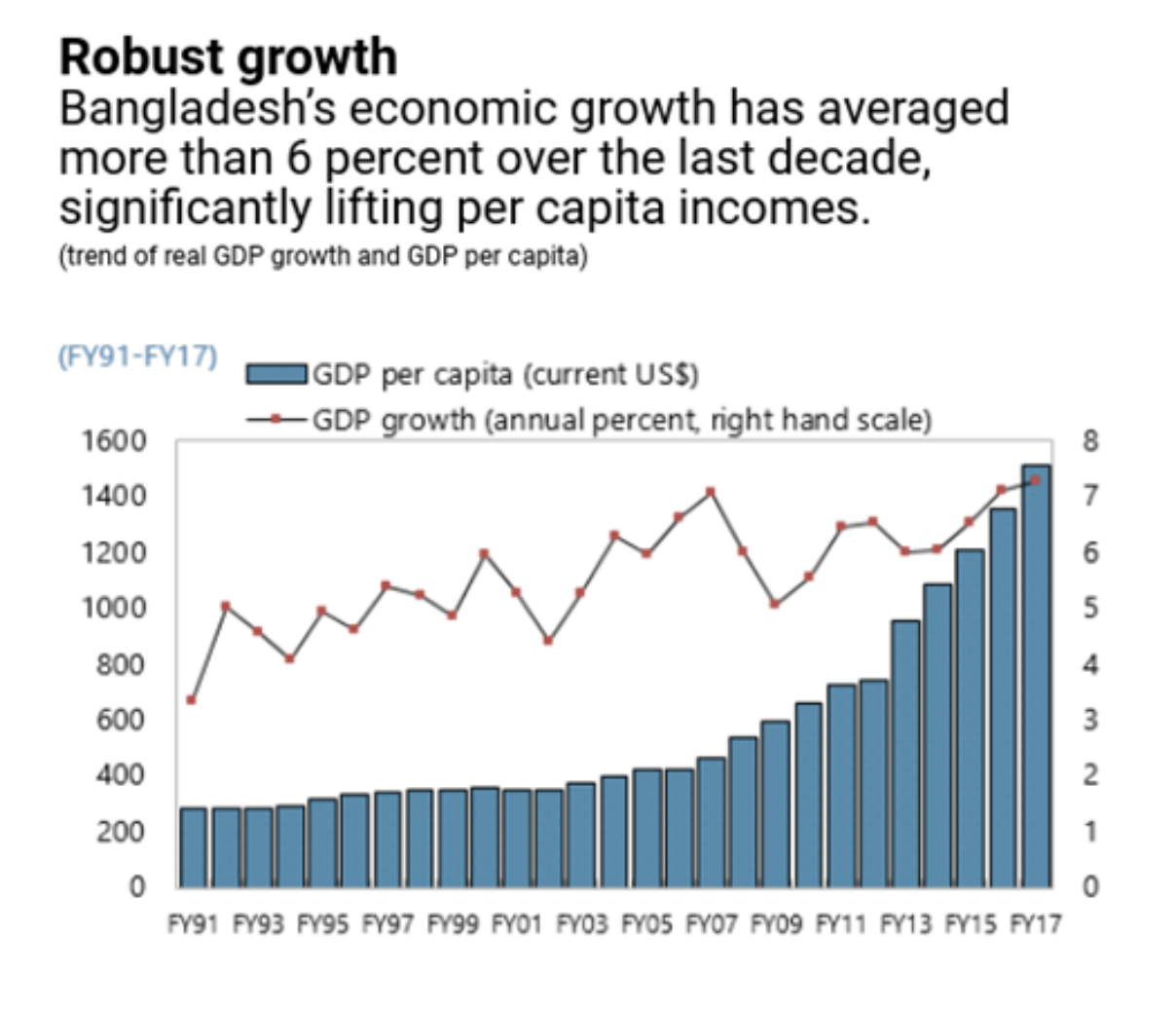Bangladesh is booming - and here's why, says the Prime Minister

Shipbuilding is just one of Bangladesh's ongoing economic success stories Image: REUTERS/Mohammad Ponir Hossain

Get involved with our crowdsourced digital platform to deliver impact at scale
Stay up to date:
Bangladesh
Many see Bangladesh as a 'market’ of over 30 million middle- and affluent-class people and a ‘development miracle’. To me, our strengths are the societal values and peoples’ trust in Bangladesh. Equally, peoples’ aspiration to progress and their resilience as well as their confidence in our leadership. My father, the Father of our Nation Bangabandhu Sheikh Mujibur Rahman, dreamt of a Sonar Bangla, an exploitation-free and just society. His vision gives us the confidence to move with our vision to advance Bangladesh as a developing country by 2021 and a developed country by 2041.
Bangladesh is quickly moving to a high-value, knowledge-intensive society, beyond apparel manufacturing. Last year, we exported 12 industrial robots to Korea. Four ships made in Bangladesh have come to India. Recently, Reliance purchased a large quantity of refrigerators made in Bangladesh. Bangladesh also has 600,000 IT freelancers – the largest freelancing community. This all speaks to a quiet transformation where people have taken risks and faced challenges by becoming more innovative and adopting technology. It is time that global investors, particularly Indian entrepreneurs, invest in Bangladesh in areas like education, light engineering, electronics, the automotive industry and artificial intelligence – beyond the conventional menu.
Bangladesh is urbanizing fast. By 2030, 48% of our population will live in towns and cities. Most will be young, energetic and digitally connected. They will be agile, receptive to new ideas and look for new ways of creating wealth. In fact, this is already happening with over 110 million active internet subscribers in Bangladesh. By 2025, mobile internet penetration will reach 41% population. Rapid urbanization, fed by increasing consumption of electricity and more than 30 million middle class citizens, is indeed a huge market.
Some are concerned about the risks of investing in Bangladesh. Yes, we have challenges like many other countries. But in Bangladesh we know how to transform challenges into opportunities. This year, our economy posted record high growth of 8.1%. We are close to achieving double-digit growth. Since 2009, Bangladesh’s economy has grown by 188% in size. Our per-capita income has surpassed $1,909.
Our agriculture production is no longer about subsistence. Beyond self-sufficiency, we are now the fourth-largest rice produce, second-largest in jute producer, fourth-largest in mango production, fifth-largest in vegetable production and fourth-largest in inland fisheries in the world. We are decoding the genome of key crops and fruits to move further.
In transforming the country into a “Digital Bangladesh’, since 2009,we have ensured 100% ICT access for people at the grassroots. Our focus is to employ technology to solve common people’s developmental challenges. As a result, Bangladesh has the fifth-largest internet user population in Asia-Pacific. We are fast becoming a cashless society: last year, e-commerce transactions reached $260 million.
Today, Bangladesh offers the most liberal investment regime in South Asia – in terms of legal protection of foreign investment, generous fiscal incentives, concessions on machinery imports, an unrestricted exit policy, full repatriation of dividends and capital on exit. We are establishing 100 Special Economic Zones with one-stop service across Bangladesh. Twelve of the zones are already functioning. Two zones are reserved for Indian investors. A number of high-tech parks are also ready for technology and innovative enterprises.
In between Eastern and North-East India, China on the west and South-East Asia, Bangladesh merits the attention of global and Indian business as a seamless economic space. We can serve as the economic hub for the sub-region. Beyond our own 162 million people, Bangladesh can be the connecting landmass to a combined market of nearly 3 billion people.
Last year, HSBC predicted that Bangladesh would be the 26th-largest economy in the world, by 2030. Two things are key: one is our open society, religious harmony, liberal values and secular culture. The other is that two-third of our homogenous population is young – mostly under 25. They are quickly skill-able, adaptive to technologies, and ready to engage at competitive wages.
We are continuously learning in our journey towards development with our confident people, able leadership and governance. Bangladesh offers you a stable and humanitarian state, where leadership is responsive and responsible. That’s coupled with sound macro-economic fundamentals - and our pragmatic and open economy shall continue to set global trends and the example of a peaceful and progressive nation.
Don't miss any update on this topic
Create a free account and access your personalized content collection with our latest publications and analyses.
License and Republishing
World Economic Forum articles may be republished in accordance with the Creative Commons Attribution-NonCommercial-NoDerivatives 4.0 International Public License, and in accordance with our Terms of Use.
The views expressed in this article are those of the author alone and not the World Economic Forum.
The Agenda Weekly
A weekly update of the most important issues driving the global agenda
You can unsubscribe at any time using the link in our emails. For more details, review our privacy policy.

